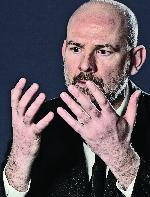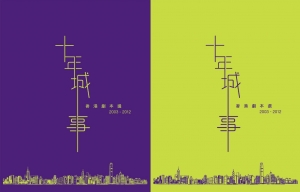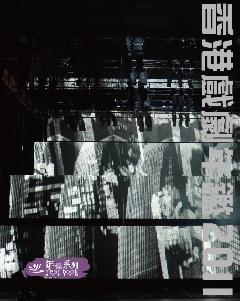 |
The theatre is one of the few places in life where I’d give unreserved credence to its doings. If only for the fact that it is also where the art of lying is at its height. But there are always a few plays which love to put its characters’ (and actors’) credibility to test and make the endeavour itself a performance. Faith Healer is one such. Much as I wanted to, I could hardly exercise my practiced suspension of disbelief in this tricksy work written by Irish playwright Brian Friel in 1979.
The entire play is composed of four extensive monologues given by turns by the three protagonists: faith healer Frank Francis Hardy(Paul Hickey), his ‘mistress’ Grace (Kathy Kiera Clarke) and his manager Teddy (Richard Bremmer). This Bristol Old Vic production, as part of the 40th Hong Kong Arts Festival, is directed by Simon Godwin. Written as though to be perused like a literature course text, Faith Healer is preoccupied with one of the most authoritative literary devices: the unreliable narrator.
The four monologues recount each character’s version of truths about Frank’s visits to remote villages in the British Isles, while revealing their relationships with the two other characters. The ‘facts’ at times conflict, at times coincide with each other, or otherwise go past one another. There is perhaps only one reliable fact in the play: everyone is a potential liar when there is more than one version of the ‘truth’. The contentsof monologues, I soon realised, were less important than the characters’ delivery. For the devil was not in the details, but the acting on the part of the characters, as well as the actors.
The most difficult unreliable narrator is one who is honest about his or her unreliability. Frank, who delivers the first and the last monologues, is deceptively candid about his dubious profession as a faith healer. Confessional dictions, such as “I always knew when nothing is going to happen”, “Yes, oh yes, they hated me” and “Occasionally, the miracle would happen”, came forthrightly from the mouth of Hickey’s Frank with a sense of insouciance. Yet, there was also a strong flavour of ‘performance’— a term the faith healer uses to describe his healing sessions— in such an open disclosure and hence making it at once suspicious and engrossing.
As the play proceeded to Grace’s monologue, a problematic aspect of theatrical monologues became apparent, namely: who is the lone character speaking to? Whereas the faith healer was a ‘performer’ by profession and supposedly always surrounded by spectators, Clarke’s Grace seemed to be confessing to an invisible audience about her unstable mental conditions. The actress’ delivery was somewhat more affected than her character requires. This, coupled with the noticeably, but not immediately relevant light changes of the indoor setting, made it an overplayed monologue. Bremmer’s grey-haired, beer-sipping Teddy, on the other hand, was an engaging speaker. Regardless of the truthfulness of his speech, his animated, yet unselfconscious humour made him a persuasive character.
While the absence of my suspension of disbelief inevitably distracted me from following closely the bits and pieces in the monologues, my digression actually found me a much more rewarding reading of the play. Faith Healer, as scholar Joe Spence remarks in the programme, is about ‘what it is to be an artist’. The analogies between the faith healer and the artist, the healing (miracle) and the arts were palpable throughout the play. And if I may add, the work is simultaneously about ‘what it is to be a member of the audience’. Frank’s opening monologue revealed a brutally honest view in this regard:
“They were despairing people. That they came to me, a mountebank, was a measure of their despair… they knew in their hearts they had come not to be cured but for confirmation that they were incurable; not in hope but for the elimination of hope; for the removal of that final, impossible chance […] And so they defied me to endow them with hopelessness.”
It is precisely this sense of hopelessness in life that makes our suspension of disbelief in the theatre all the more sensible.
(This review was published in ArtsLink, Jun 2012)
本網站內一切內容之版權均屬國際演藝評論家協會(香港分會)及原作者所有,未經本會及/或原作者書面同意,不得轉載。








